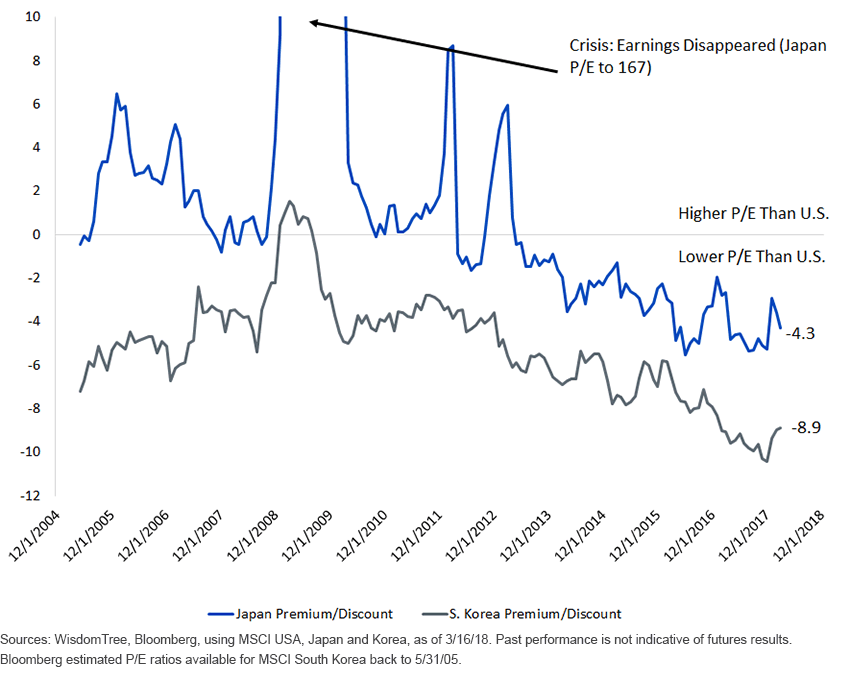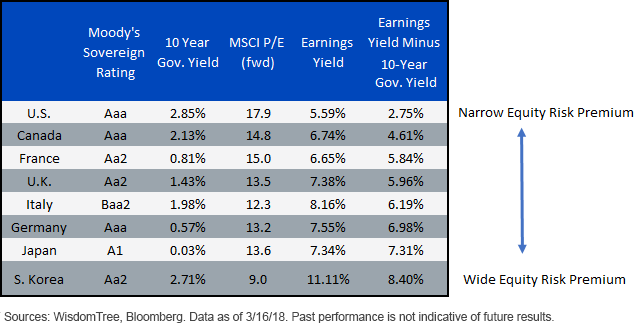Will Northeast Asian P/E Multiples Rise if North Korean Risk Fades?



No sitting U.S. president has ever met with a leader of North Korea.1 That may soon change. President Donald Trump announced in early March that he’s accepted an invitation to meet with North Korean dictator Kim Jong-un as early as May, entering negotiations that could result in North Korean denuclearization and a significant reduction in regional hostilities. A Trump-Kim deal is far from a foregone conclusion, as a specific agreement, including an inspections and verification protocol, still needs to be worked out.
But if President Trump defangs North Korea through his policy of maximum diplomatic, economic and military pressure, it would make the world considerably safer and also remove one of the major geopolitical risks hanging over the market, specifically in Northeast Asia.
No Warheads, No Equity Discounts?
One of the reasons South Korean stocks have traded historically at a discount to both the MSCI Emerging Markets Index and U.S. equities2 has been the potential for hostilities emanating from the north. But if U.S. negotiations result in a less belligerent and denuclearized North Korea, that could have major implications for investors in South Korean and potentially Japanese stocks.
The chart below shows that over the past decade both South Korea and Japan have been trading at widening discounts to the U.S. stock market, with some of the greatest price-to-earnings (P/E) gaps occurring in the last 12 months—a period in which North Korean nuclear and ballistic missile tests have increased the potential for military confrontation.
The MSCI USA Index is trading at 17.9x forward earnings while Japan and South Korea languish at 13.6x and 9.0x, respectively. That means Japan, on a forward P/E basis, is trading at a 24% discount to the U.S. while South Korea’s discount is 50% (figure 1). If Trump and Kim can come to mutually acceptable terms, could these historically high discounts begin to close with waning tensions on the Korean peninsula?
Figure 1: Forward P/E Discounts to U.S. Equities

Hundreds of Basis Points
In much of WisdomTree’s recent work, especially our Japanese equity research, we have pointed out the yawning gap between earnings yields and sovereign bond yields across most of the developed world. At the top of figure 2, which shows the G7 economies plus South Korea, the MSCI USA Index has a forward earnings yield of 5.59%, or 275 basis points (bps) more than 10-year sovereign obligations of the Aaa-rated government. At the bottom of the list dwell Japan and South Korea, which offer earnings yields that are 731 bps and 840 bps higher than their respective government obligations. Such premiums are hundreds of basis points higher than those offered in the U.S.
If President Trump succeeds in securing a historic foreign policy achievement that has eluded his predecessors for several decades, Japanese and South Korean equities could be in for a pleasant surprise.
Figure 2: G7 and S. Korea Earnings Yield Spread over Sovereign Bonds

Investment Takeaways
An agreement to denuclearize the Korean peninsula would help to reduce tensions in Northeast Asia and could have the residual effect of making it more difficult for Iran to acquire ballistic missile technology from North Korea. This may be viewed as reducing global geopolitical risk, which could extend the “risk on” environment for stocks … and expand P/E ratios in South Korea and Japan.
For investors looking to gain exposure to South Korea, the WisdomTree exchange-traded fund that contains the greatest allocation there is the WisdomTree Emerging Markets Consumer Growth Fund (EMCG). It currently has 17.1% of its holdings in South Korean equities.
For investors interested in gaining an approximate market capitalization weight to South Korea, the WisdomTree Emerging Markets ex-State-Owned Enterprises Fund (XSOE) currently has 15.5% of its holdings in South Korean stocks. As its name states, it cuts out companies that have heavy government ownership, covering broad emerging markets with companies that can focus on the bottom line.4
For investors keen to own Japanese stocks, the WisdomTree Japan Hedged Equity Fund (DXJ) is WisdomTree’s largest Japan fund, with approximately $7 billion in assets at the time of this writing.
Another, the WisdomTree Japan SmallCap Dividend Fund (DFJ), is currently a $1 billion fund that owns over 700 small-cap companies without the currency hedge.
1“Trump and Kim Jong-un, and the Names They’ve Called Each Other,” New York Times, 3/9/18.
2Bloomberg estimated forward P/E data available starting 5/31/05. MSCI South Korea Index median forward P/E discount to MSCI Emerging Markets Index is 1.4 multiple points; median discount to MSCI USA is 5.1 P/E
3All ratings herein by Moody’s. Aaa-rated as of 3/16/18.
4Source: WisdomTree, as of 12/31/17 for EMCG and XSOE. Holdings subject to change.
Important Risks Related to this Article
There are risks associated with investing, including possible loss of principal. Foreign investing involves special risks, such as risk of loss from currency fluctuation or political or economic uncertainty. Funds focusing on a single sector and/or smaller companies generally experience greater price volatility. Investments in emerging, offshore or frontier markets are generally less liquid and less efficient than investments in developed markets and are subject to additional risks, such as risks of adverse governmental regulation, intervention and political developments. Funds focusing their investments on smaller companies or certain sectors increase their vulnerability to any single economic or regulatory development. Investments in currency involve additional special risks, such as credit risk and interest rate fluctuations. As some of these Funds can have a high concentration in some issuers, the Funds can be adversely impacted by changes affecting those issuers. These Funds invest in the securities included in, or representative of, their Index regardless of their investment merit and the Funds do not attempt to outperform their Index or take defensive positions in declining markets. Due to the investment strategy of these Funds, they may make higher capital gain distributions than other ETFs. Please read each Fund’s prospectus for specific details regarding the Fund’s risk profile.



